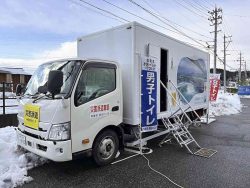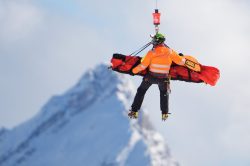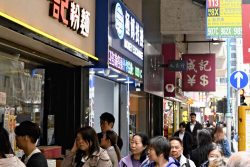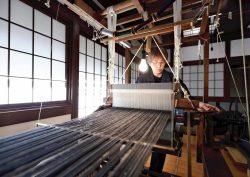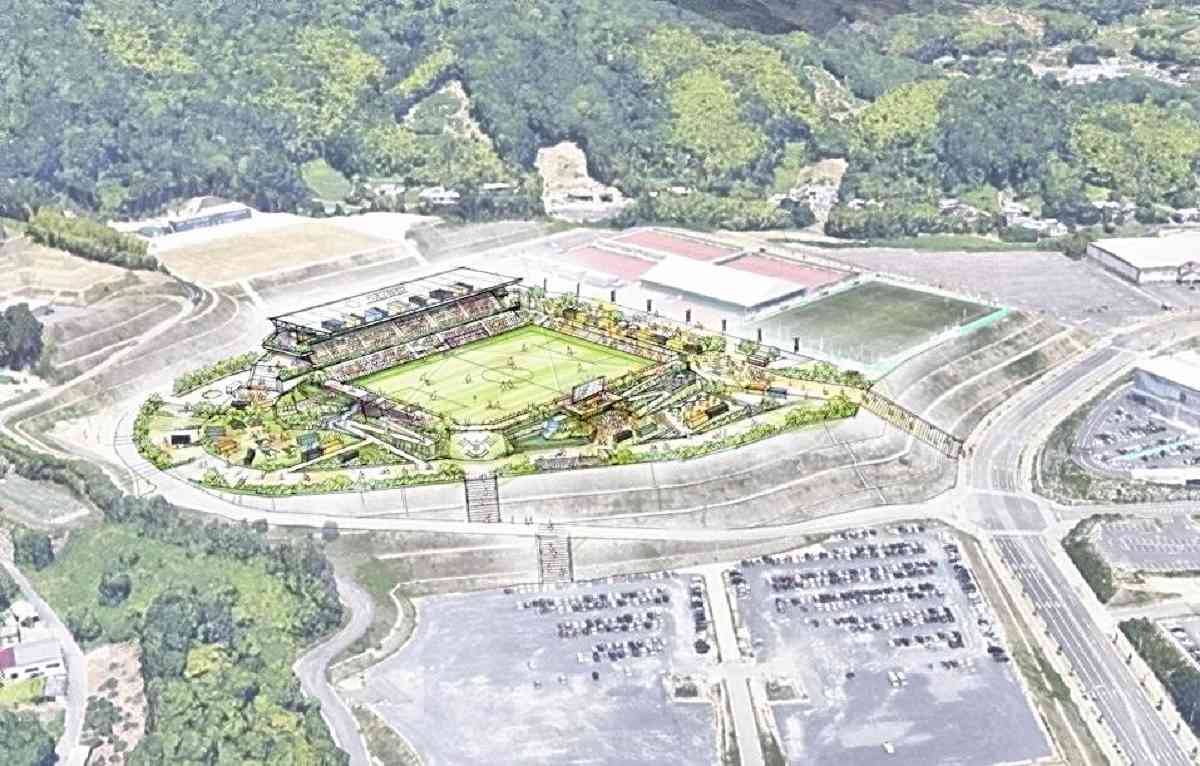
The design concept for the new stadium that the FC Imabari soccer club plans to construct.
13:31 JST, December 24, 2020
The nationwide construction of sports facilities and their expansion projects have been postponed and reexamined one after another, mainly because local governments and regional economies are both suffering amid a deteriorating financial climate as novel coronavirus infections spread.
There are also efforts to explore new approaches to operating sports facilities, including the notion of coexisting with the contagion.
■ All research funding cut
The Fukui municipal government, which planned to construct a soccer complex in a suburban area in 2022, was scheduled to conduct a geological survey this year. Designs for the center — with a construction cost amounting to ¥800 million — called for six fields, including futsal grounds and a soccer pitch with artificial turf, spectator seating and lights for night matches.
However, the city’s initially projected tax revenue of ¥44.5 billion was forecast to drop by more than ¥2.9 billion, a decline previously seen in 2009, one year after the financial crisis that followed the collapse of U.S. investment bank Lehman Brothers.
The municipal government cut all ¥35 million of funding allocated for the research and the design of the center.
A municipal government official in charge let out a sigh as he said, “We were forced to face the reality that sports can be part of things when everyday life is normal. It’s difficult to garner the support of the citizens who don’t play soccer simply with reasons like it’s a benefit to competitive development or it’s an inviting place to hold training camps.”
FC Imabari, whose owner is former Japan national soccer team manager Takeshi Okada, planned to launch construction of a new stadium in October.
The new venue was designed to hold 10,000 spectators. The team planned to raise about ¥4 billion by borrowing money and accepting donations from local firms to construct the stadium on land leased free of charge from Imabari City, Ehime Prefecture.
However, the coronavirus crisis was a direct blow to the region’s economy, resulting in the declining of business performance of local industries such as shipbuilding and towel production.
As a result, the club has decided to put off the start of construction until January 2022. The municipal government will look to solicit donations to help finance the project, with the target set at ¥1 billion, and also take advantage of a system in which tax deductions are provided for businesses that make donations to municipalities.
■ Multipurpose venues favorable
The central government in 2016 set a goal of expanding the market size of sports from ¥5.5. trillion in 2015 to ¥15 trillion by 2025. It also announced reform guidelines for stadiums and arenas that can serve as the central location for regional revitalization while sparking new activities.
The guidelines recommend multifunctional facilities such as Tokyo Dome (in Tokyo) and Mazda Zoom-Zoom Stadium (in Hiroshima City) that are in downtown locations and can not only be used for sporting events, but also for concerts and other entertainment purposes while providing a variety of food and drink.
The government plans to build about 20 such facilities by 2025.
The construction of these types of sports venues can be expected to have a ripple effect on employment, the hotel industry and tourism.
In addition, it is possible to anticipate a reduction of national medical expenses of more than ¥40 trillion as chances increase for the general public to be engaged with sports.
Former Sports Agency Commissioner Daichi Suzuki said emphatically: “[The guidelines] are aimed at changing the concept of baseball and soccer stadiums and boosting regional sports. These efforts are necessary even amid the coronavirus crisis.”
In the case of new sports facilities under construction, the challenges will be how to deal with maintenance and management costs after their completion. To resolve this issue, it is essential to enhance earning capacity by devising ways of generating profits even when they do not hold sports events.
Concerning the impact of the coronavirus, Tokyo City University Prof. Aya Sakai, an expert in urban planning, pointed out, “There is the possibility that the sense of values called for on the part of stadiums will change.”
She said the necessity for stadiums will not change as the places where baseball and soccer are played and entertainment events are held. “Chances of viewing sports events at home will increase. How to convey on-the-spot ambiance to the people outside the stadium? It is important to continue considering how to ensure a profit online,” Sakai added.
■ Ensuring safety and security
The opening of one stadium was delayed for the benefit of ensuring virus infection measures.
Major online and TV shopping operator Japanet Holdings Co., the parent company of second-tier J.League soccer club V-Varen Nagasaki, postponed the opening of its stadium in Nagasaki City by one year, pushing the date back to 2024.
The capacity was initially set at 23,000, but Japanet Holdings is considering reducing the figure to about 20,000 by expanding the space between seats.
As a virus prevention measure, the company said it is considering introducing antibacterial substances for public places that fans touch. Said an official in charge: “We’ll consider providing an environment in which spectators can enjoy games as safely and with as much peace of mind as possible, even during the coronavirus crisis, by adopting equipment such as contact-less sensors that do not have switches.”
It is imperative to explore ways of constructing venues where everyone can enjoy sports while devoting the necessary attention to coronavirus infections and social circumstances, while also looking forward at the aging society.
■ Govt strategy to attract foreign visitors
As a measure to revitalize regional areas through sports, the government in 2018 put forth “a strategy to expand the demand for sports tourism.”
Two pillars of the strategy were outdoor sports and martial arts. Because both target overseas enthusiasts, the drop in the number of foreign visitors due to the coronavirus pandemic was a heavy blow.
Precipitous mountains, thousands of small islands and an abundance of nature, all of which have their own charm in each passing season, are features unique to Japan.
While high-quality powder snow can be enjoyed in Hokkaido and the Shinshu region, waves suitable for surfing can be found along beaches on the Pacific side of Japan. Rafting can be enjoyed at Yoshino River in Tokushima Prefecture.
Japanese martial arts, including karate and kendo or Japanese fencing, have been gaining popularity overseas in recent years. According to the Sports Agency’s survey of seven nations, including the United States, Australia, China and South Korea, more than 30%, or the biggest portion of the respondents, selected budo Japanese martial arts over baseball, soccer and sumo when answering the question, “Which sport would you like to go and see in Japan?”
The “Budo Tourism Japan — The Spirits of Budo,” which is a video produced in December 2018 by the Sports Agency, has been viewed on YouTube more than 3.2 million times and many comments showing interest have been made in foreign languages. Said the aforementioned Suzuki: “There are many people overseas who say they want to see and experience it [budo]. By taking advantage of its attractions, it is advisable to boost the number of inbound travelers and attract foreigners to regional areas.”
It is believed that there are a considerable number of foreigners who want to travel to Iga (in Mie Prefecture) and Koga (in Shiga Prefecture) to visit ninja villages as well as Okinawa Prefecture, where karate is said to have originated.
In view of this, it is essential to promote dissemination of information in preparation for a post-coronavirus situation.
Top Articles in Society
-

Man Infected with Measles May Have Come in Contact with Many People in Tokyo, Went to Store, Restaurant Around When Symptoms Emerged
-

Woman with Measles Visited Hospital in Tokyo Multiple Times Before Being Diagnosed with Disease
-

Australian Woman Dies After Mishap on Ski Lift in Nagano Prefecture
-

Foreign Snowboarder in Serious Condition After Hanging in Midair from Chairlift in Nagano Prefecture
-

Record-Breaking Snow Cripples Public Transport in Hokkaido; 7,000 People Stay Overnight at New Chitose Airport
JN ACCESS RANKING
-

Japan Institute to Use Domestic Commercial Optical Lattice Clock to Set Japan Standard Time
-

Israeli Ambassador to Japan Speaks about Japan’s Role in the Reconstruction of Gaza
-

Man Infected with Measles May Have Come in Contact with Many People in Tokyo, Went to Store, Restaurant Around When Symptoms Emerged
-

China Eyes Rare Earth Foothold in Malaysia to Maintain Dominance, Counter Japan, U.S.
-

Prudential Life Insurance Plans to Fully Compensate for Damages Caused by Fraudulent Actions Without Waiting for Third-Party Committee Review


